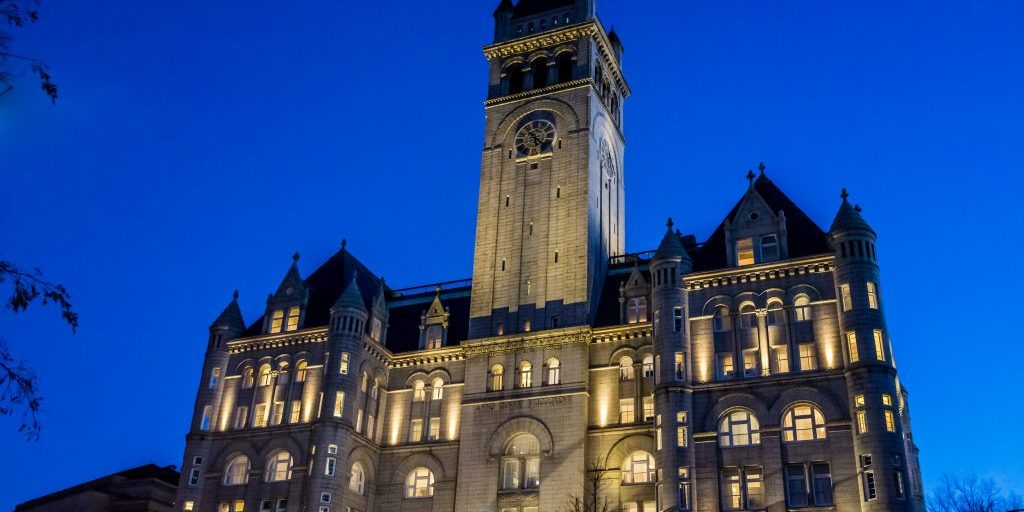Judge Appears Sympathetic to Emoluments Lawsuit Against President Trump
BY Hannah Felfe

LISTEN
Last December, several plaintiffs unsuccessfully attempted to sue President Trump over the bond between his presidency and his financial empire.
Federal district judge, George Daniels, dismissed the claims that President Trump is violating the Emoluments Clause.
Daniels determined the plaintiffs’ lawsuit was invalid because the Foreign Emoluments Clause can only be acted on by Congress -- not by any citizen.
The Foreign Emoluments Clause, of the Constitution, forbids federal officials from accepting gifts or titles from a foreign government without the consent of Congress.
Trump's attorneys claimed that the foreign and domestic emoluments clauses are not applicable as Trump has not received Congress’ approval.
Citizens for Responsibility and Ethics in Washington (CREW), a group promoting government accountability, has partnered in the case with three other plaintiffs associated with the hospitality industry in Washington, D.C. and Manhattan.
Deepak Gupta, the plaintiffs’ attorney, said, “We are not going to walk away from this serious and ongoing constitutional violation. The Constitution is explicit on these issues.” Gupta is planning for an appeal.
Trump is the first president to possess an international financial empire. Critics say that with his restaurants, golf clubs and hotels, Trump could easily receive gifts from foreign governments by channeling financial gains through his enterprises.
Over 200 Democrats in the House and Senate believe that by not asking for Congress’ approval, Trump is directly violating the Foreign Emoluments Clause. Many believe that Congress should get involved.
This case was the first emoluments lawsuit in federal courts. Two other cases are pending.
A couple of weeks ago, another federal judge appeared to be sympathetic to allegations brought by the plaintiffs, that President Trump is violating the Constitution's Emolument Clause.
The plaintiffs in the current suit are the Democratic attorneys general of Maryland and Washington, D.C. Their claim is similar to the allegations brought by CREW’s earlier lawsuit -- that the president is accepting money from foreign governments, a violation of the Foreign and Domestic Emoluments Clauses.
“The fact is, Trump is taking money from foreign governments,” Brian Frosh, Maryland’s Attorney General said to reporters post-hearing. “He’s taking money from the United States that he’s not entitled to, and he’s also receiving payments from states -- all that violate his oath of office.”
One of the major issues the plaintiffs approached is the Trump International Hotel, opened few weeks before Trump was elected and only a couple blocks away from the White House. The plaintiffs claim that wealthy officials favoring President Trump can possibly use the hotel to bias his decisions. Additionally, the hotel is absorbing potential business from others in the industry in and around the District of Columbia.
The District of Columbia attorney general Karl Racine said, “Congress has given the president a total pass. State attorney generals are serving as a necessary check and balance in the Trump era where others failed.”
The Department of Justice has taken President Trump’s side in the matter, having previously asked for the CREW v. Trump case to be dismissed.
Judge Peter Messitte, the federal district judge on the current case, has expressed multiple questions for both the plaintiffs and for the defendant. Messitte coaxed deputy solicitor general of D.C. Loren AliKhan to name Trump as a defendant both president and personal. AliKhan appeared hesitant, and Messitte stated, “It’s your call, not mine.”
It is possible that because the plaintiffs of Maryland and the District of Columbia’s are government figures they will have a more firm stance than CREW had. Frosh claims that if the suit develops in his and Racine’s favor they will work diligently to get the information regarding President Trump’s tax returns. This would allow insight to Trump’s business partnerships and deals.
With Messitte’s questions, the plaintiffs felt hopeful for the lawsuit to progress in their favor. Racine said, “We came into this case confident about our standing, and we leave this courthouse even more confident.”
LATEST STORIES



